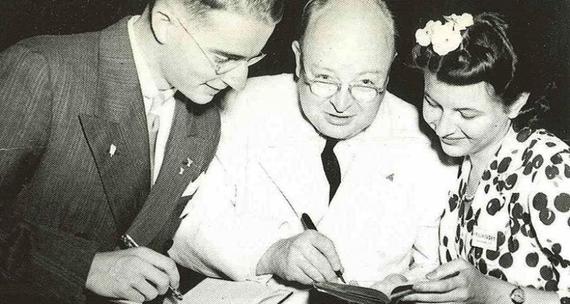According to science geek legend, while attending the 1939 New York World's Fair, G. Edward Pendray, a Westinghouse executive, and Watson Davis, director of Science Service (now Society for Science & the Public) began discussing ways to encourage more students to pursue science careers. Westinghouse agreed to provide prize money and cover administrative costs. The Westinghouse Science Talent Search was born. It continued for more than half a century until Westinghouse's power as a manufacturing company began dimming quickly.
In 1998, Intel Corporation became the title sponsor of the prestigious competition, continuing the tradition for 17 years. In 2015, Intel abruptly announced it would no longer fund the Science Talent Search and while the company never cited a reason, the suspicion was that Intel wanted something glitzier and hipper than the school-based science competition. (see The Atlantic article written at the break up time.)
Just this week, Regeneron Pharmaceuticals, a biotech company, became the next sponsor to carry on the Science Talent Search. They increased the financial commitment to $100 million dollars and committed to fund it through the next decade. Regeneron doesn't manufacture and it doesn't make chips. A public company known for groundbreaking cures for retinal disease and cholesterol management, Regeneron represents a new genus of company spearheading the prestigious award and the epitome of the next generation of corporations.
The Science Talent Search, a storied program that inspires deep science, mentorship and an introduction into the world of professional science parallels our economic and scientific history. Westinghouse was a manufacturer and represented science in the age of industrial automation. Intel grabbed the reins during the Information Age, when a chip held the power to change science. Now, Regeneron applies Big Data and neuroscience to developing cures for disease during the applied information science age.
George Yancopoulos, Founding Scientist and Chief Scientific Officer of Regeneron (and non-coincidentally a finalist of The 1976 Westinghouse Science Talent Search) likened the Science Talent Search awards to "the Nobel Prize for high school students." At a press conference on May 26th announcing Regeneron's sponsorship, he recalled taking the subway from his home in Queens, New York up to The Bronx High School of Science at ungodly morning hours, to work with his advisor on his project, learning what true research and scientific commitment entails.
Science fairs come and go. (Research indicates that they go more than they come.) And much has been made of the more "in the moment" maker movement, kid's playing with and developing a passion for science. But the Science Talent Search has survived for 75 years because of a standard of excellence that none have been able to replicate. Program alumni include 5 National Medals of Science, 12 MacArthur Foundation Fellowships, and 12 Nobel Prize medals.
As we head into the post-information age, a tip of the hat to Regeneron for seeing the future while preserving the past.
Robin Raskin is founder of Living in Digital Times (LIDT), a team of technophiles who bring together top experts and the latest innovations that intersect lifestyle and technology. LIDT produces conferences and expos at CES and throughout the year focusing on how technology enhances every aspect of our lives through the eyes of today's digital consumer.

